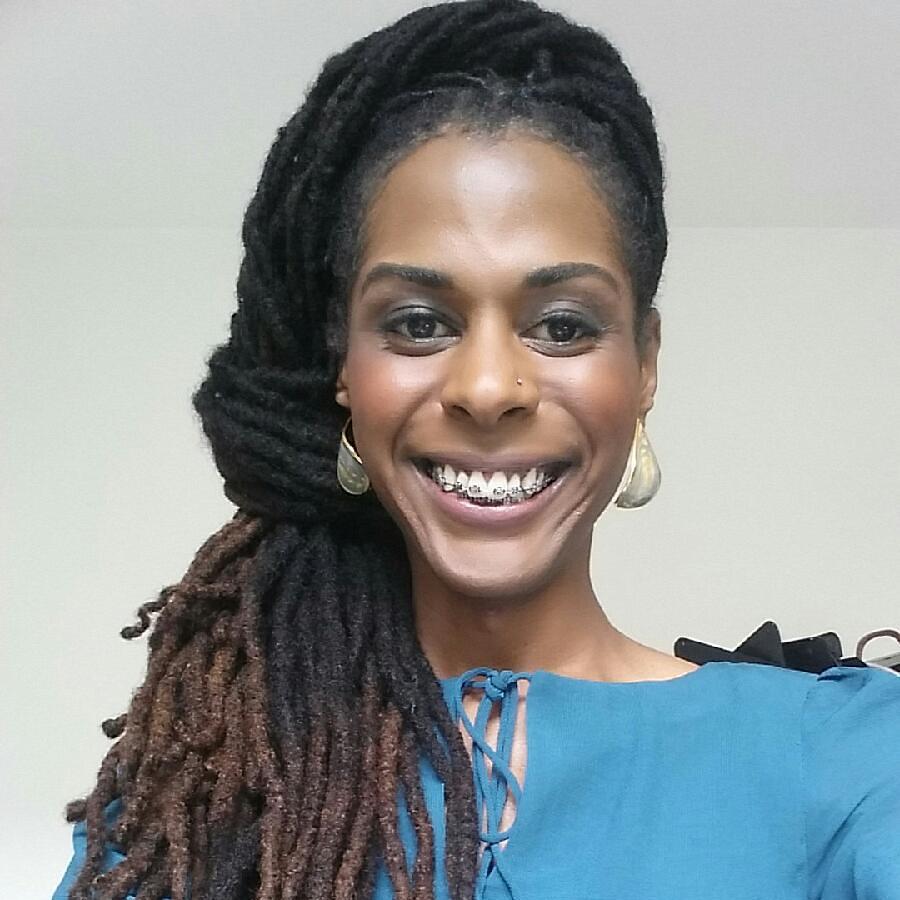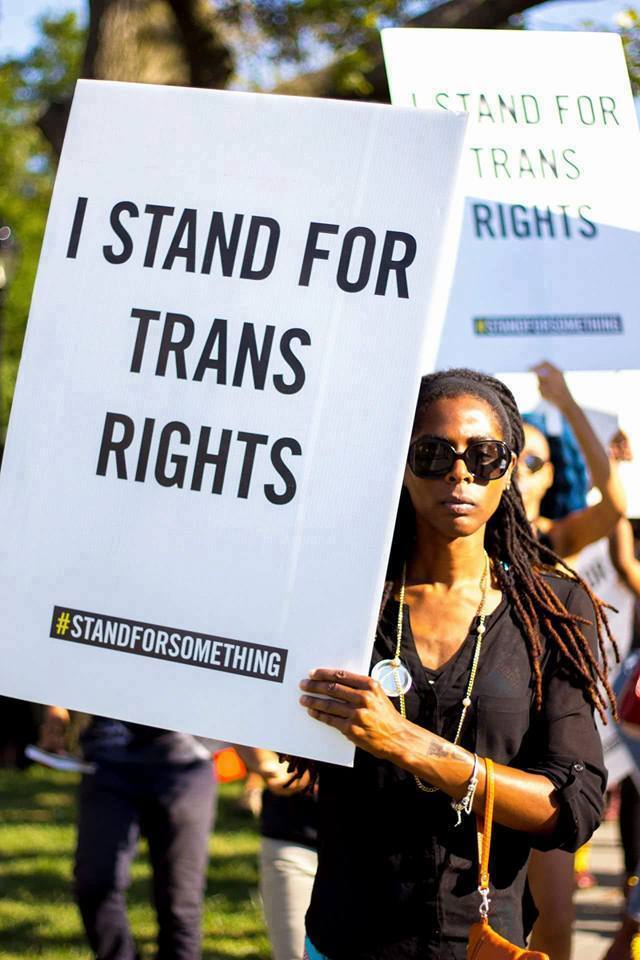This transgender woman helps the community speak for themselves.
This is part of a story series about the lives of transgender people. Read the introduction here.
 Bré Anne Campbell doesn’t want to see another trans woman of color murdered. It’s a sobering problem across the country, but especially in Detroit, where Michigan’s lack of anti-discrimination protections for LGBTQ people often forces transgender women into the street economy because it’s the only job they can find. Then, of course, there are the random acts of violence against trans women that have nothing to do with their line of work.
Bré Anne Campbell doesn’t want to see another trans woman of color murdered. It’s a sobering problem across the country, but especially in Detroit, where Michigan’s lack of anti-discrimination protections for LGBTQ people often forces transgender women into the street economy because it’s the only job they can find. Then, of course, there are the random acts of violence against trans women that have nothing to do with their line of work.
So after the vicious murder in 2011 of Shelly Hilliard, who went by the name Treasure — she was dismembered and her body parts were strewn across the city — Campbell decided enough was enough. She began having conversations with her friend John Trimble, which eventually led them to establish the Trans Sistas of Color Project. The project officially launched in 2015 with Campbell as executive director and Trimble as deputy director. Campbell explains the organization’s mission.
I wanted to create an organization for trans women of color who were facing discrimination. Our project started a six-month program we’d put trans women through to facilitate getting their names changed and then we’d reintroduce them after their name changed — like a debutante ball. We had everything we needed but funding.
Launching the project didn’t happen overnight, but Campbell was determined, especially as the number of murders of transgender women continued to rise. In 2015, 21 trans women were murdered in the United States. When Amber Monroe became the 12th trans woman of color murdered in Detroit last year, Campbell was out of town, participating in a fellowship with an organization where she says no one ever spoke to her … until Monroe’s death.
“They wanted me to talk about it and write about it as a trans woman of color,” says Campbell, who began transitioning in 2010. “I pushed back a lot because they only wanted to talk about sex work. If you’re going to talk about my friend Amber, I’m not going to just talk about her sex work. I’m going to talk about her life.”
That was the breaking point for Campbell. She knew she had to come home and hit the ground running with the Trans Sistas of Color Project. She has sacrificed a great deal to create this organization, including giving up her apartment and moving back in with her family, and wiping out the savings she’d set aside surgery.
The organization’s first event lost money, and Campbell admits she was deeply discouraged. But then she got a call from Steph White, executive director of Equality Michigan. White wanted to know what they could do to help, and after some conversations Equality Michigan became the fiscal sponsor of the Trans Sistas of Color Project.
“Now we’re an organization,” says the 30-year-old Campbell. “We’re going to build sisterhood with trans women in Detroit by mobilizing the community to start training for activism. Everyone’s activism is important, from the front of the line to the back. I want to be intentional about framing the conversation that everyone is an activist.”
 Campbell is no stranger to activism. She began this work in 2004, with the AmeriCorps program in Detroit, where she gained experience in HIV advocacy. She’s worked on HIV advocacy with several organizations, and was diagnosed with HIV herself in 2010, just two months before she began transitioning.
Campbell is no stranger to activism. She began this work in 2004, with the AmeriCorps program in Detroit, where she gained experience in HIV advocacy. She’s worked on HIV advocacy with several organizations, and was diagnosed with HIV herself in 2010, just two months before she began transitioning.
“My HIV activism was the beginning of my work on transgender advocacy, although I didn’t realize it at the time,” Campbell says. “I was advocating for HIV and didn’t see the need to advocate about my trans identity at first.”
But it didn’t take long for Campbell to step up her transgender advocacy. Although she says transitioning was easy for her — because she had the support of her family and friends, as well as her employer at the time — she spent her entire life until then struggling with her gender identity.
“I compare it to taking two magnets and trying to force them together: When you push them together they push back,” Campbell says. “That’s how I felt in my body, that my inward body was pushing against my outward body and they weren’t connecting. There was a lot of depression.”
Although Campbell had an overall positive experience with her transition, she faced discrimination from the beginning.
In the fall of 2010 I applied for housing in Detroit. When I asked why I wasn’t approved, I got several different answers from management. One of them was that I lied on my application, that the name I gave them didn’t match who I was. I explained I was in the process of transitioning and hadn’t had my ID changed. I explained they needed to process my paperwork according to my ID but not to call me by that name. For two years, I tried to hold them accountable only to have the City of Detroit say I didn’t have a case because there’s no protections in the state for trans individuals.
From that moment on, Campbell says she began speaking out a lot more about being transgender — and being a person of color, and someone living with HIV. In her personal advocacy and through the Trans Sistas of Color Project, intersectionality is important to Campbell.
“For me, as an advocate, there’s this constant feeling of having all these issues you face yourself being thrown in your face,” she says. “You not only have to advocate for yourself but for others.”
Throughout that process she was working for an organization that was very trans-inclusive, which included allowing people to use the bathroom that fits their gender identity. But a university Campbell was working for threatened to fire her for using the women’s bathroom. She suspects it’s because she was in the process of getting her name legally changed — yet another issue that’s a challenge for the transgender community.
I spent $400 changing my name. Every time I need to verify my identity, the first thing people do is congratulate me. They think I changed my name because I got married. When I explain it’s my first and middle name I changed, they look at me with disgust and confusion. As someone who is considered successful and has the privilege of ‘passing’ [as a woman]. I still struggle with having to go into places and disclose this really personal information about myself.
Bathrooms and other public spaces continue to be an issue for Campbell, just like the rest of the transgender community, especially given the increasingly hateful rhetoric around “bathroom bills” and other anti-LGBTQ legislation.
It’s scary out here. I could walk into a bathroom and have someone violently pull me out. I could be walking down the street, have someone be attracted to me and then be assaulted because they find out I’m trans.
I’ve been sexually assaulted, but I’m fortunate to still be here to tell my story. There are so many people whose lives have been taken away, just for being who they are.
It’s scary in Michigan, considering everything that’s going on. We get called perverts, we get labeled as deviants — while they’re the ones focused on our body parts.
When even some in the larger LGBTQ community have been less than helpful in advocating for the transgender community, Campbell has persevered. In fact, she believes strongly in creating an organization that lets trans women of color advocate for themselves — and lift themselves up out of poverty and despair.
Campbell has mindfully built a diverse organization made up of people from all walks of life and perspectives. Building future leaders for the movement is a personal goal for Campbell. For the Trans Sistas of Color Project, the larger mission is to open a 24-hour community center for transgender women in Detroit. This drop-in space will include showers, beds, food, clothing, and access to case management services. After the community center is established, the next initiative is to establish a transitional living program for trans women in Detroit, Campbell says.
A lot of women are homeless. They want to get off the street — get out of the street economy. Some trans women choose to be sex workers but many others are forced into the work because of discrimination. There aren’t a lot of homeless shelters that accept trans women, and those that do, I have a friend who was sexually assaulted by someone who worked at the shelter.
So many trans women want to get off the streets and be safe. I’m tired of trans women being victims. We want to provide them a way off the streets. If we do that and create leaders, then lives can change. In fact, we’re already changing lives — something I didn’t expect to happen for a couple of years.
Campbell has ambitious goals, and she is determined to help transgender people, especially trans women of color, gain the skills and confidence to speak for themselves, just as she has.
“The struggles I face, along with the possibility of violence on me, is a better feeling than being depressed because I was living a life I didn’t identify with,” Campbell says. “At the end of the day, trans people just want to be happy, and we’re willing to risk our lives for it. But we shouldn’t have to. So, as a community, we need to make some noise.”
Read all the stories in this series HERE.
[Photos courtesy of Bré Anne Campbell.]



